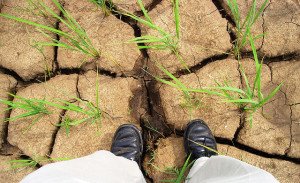Unchecked climate change will hit food production so severely that an extra half a million people could die through changes in diet and bodyweight in 2050, compared with a world where emissions are curtailed.

The figure comes from a new UK study published today in the leading medical journal the Lancet. Taking into account projected climate-related changes in global food production, trade, and consumption, researchers calculated how many extra deaths would occur in countries around the world, and say three quarters would be in India and China.
New Zealand, according to their analysis, would experience an extra 350 deaths per year in 2050, due to changes in fruit and vegetable intake. However, there would be an estimated 60 fewer deaths per year thanks to lower rates of obesity and red meat consumption.
You can access the further press material on Scimex.org.
In a commentary piece published alongside the article, Professor Alistair Woodward from the University of Auckland and Professor John Porter from the University of Copenhagen, write that the study is “the first to assess the effect of changes in diet composition under climate change”.
“According to the Intergovernmental Panel on Climate Change, the effects of climate change on food security could be some of the most serious in the near-to-medium term, especially if global mean temperature increases by 3-4°C or more,” they add.
The SMC collected the following expert commentary. Feel free to use these quotes in your reporting.
Prof Alistair Woodward, head of Epidemiology and Biostatistics, University of Auckland, comments:
“In nearly all respects, New Zealand is not as severely affected by climate change as other parts of the world. This is true for food and nutrition. But it would be a mistake to assume we are immune.
“The effects of drought on rural communities and the national economy are a clear signal that climate matters very much in this country.And we are not protected from international disruptions, in an age of global supply chains and finely balanced commodity markets. Migration is another pressure, and repeated crop failures in the tropics will certainly cause people to move.”
A full University of Auckland media release is available here.
Prof Simon Hales, Department of Public Health, University of Otago, Wellington, comments:
“The projected effects in New Zealand are similar to those in other high-income countries, on a per capita basis. Low and middle income countries are most affected.”
What could we do avoid the projected increase in diet-related deaths?
“Mitigate climate change through emissions reductions and increase production and consumption of nutritious plant based foods; reduce production and consumption of animal products and energy-dense processed foods.”
What other, non-diet, climate related factors could have a negative impact on us in a warmer future?
“Direct effects (deaths and injuries) from extreme climate events such as heatwaves, floods and storms; effects mediated by natural systems, including water-borne, food-borne and vector-borne communicable diseases; effects mediated by social factors, including loss of livelihoods, lost work capacity due to heat stress, migration.”
From the UK Science Media Centre:
Prof Andrew Challinor, Professor of Climate Impacts at the University of Leeds, comments:
“This is a valiant attempt to quantify the effects of climate change on the future of food production. The authors highlight some potentially important issues about the impacts of climate change on our future health.
“Of course it’s very difficult to estimate exactly what those impacts will be. What we can say for certain is that the pressures on agricultural production will certainly be greater because of climate change. Year to year variability of food production will become greater, which will make global food markets more unpredictable. And extreme climatic events will become more common, such as the wheat harvest failure in Russia in 2010 which affected UK food prices.
“The effects of these events on global food availability and prices will be felt in the UK and around the world.”